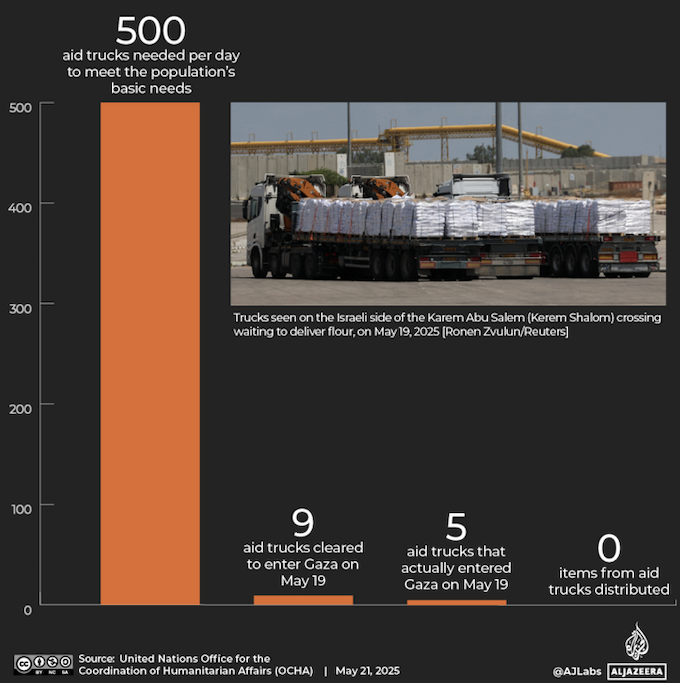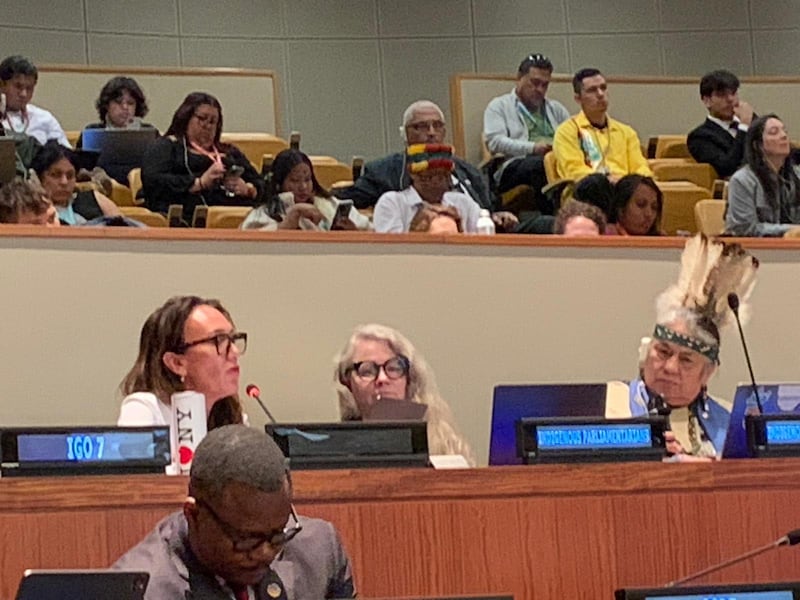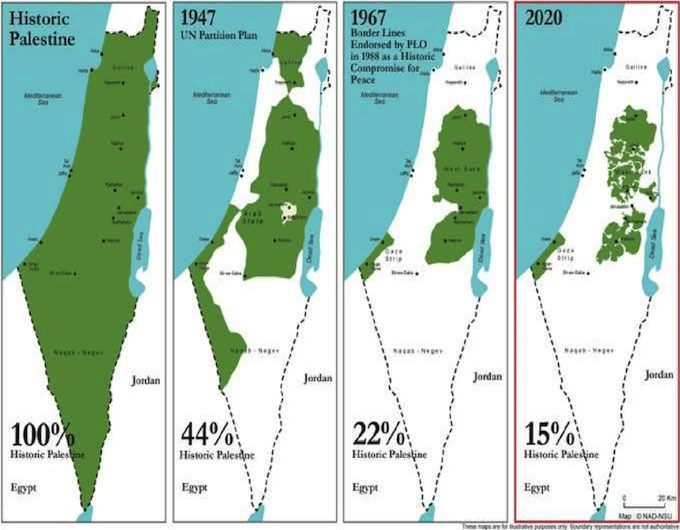
As Israel unveils its final genocide push, and mass death from starvation looms in Gaza, western media and politicians are tentatively starting to speak up.
Who could have imagined 19 months ago that it would take more than a year and a half of Israel slaughtering and starving Gaza’s children for the first cracks to appear in what has been a rock-solid wall of support for Israel from western establishments.
Finally, something looks like it may be about to give.
The British establishment’s financial daily, the Financial Times, was first to break ranks last week to condemn “the West’s shameful silence” in the face of Israel’s murderous assault on the tiny enclave.
In an editorial – effectively the paper’s voice – the FT accused the United States and Europe of being increasingly “complicit” as Israel made Gaza “uninhabitable”, an allusion to genocide, and noted that the goal was to “drive Palestinians from their land”, an allusion to ethnic cleansing.
Of course, both of these grave crimes by Israel have been evidently true not only since Hamas’ violent, single-day breakout from Gaza on 7 October 2023, but for decades.
So parlous is the state of western reporting, from a media no less complicit than the governments berated by the FT, that we need to seize on any small signs of progress.
Next, the Economist chimed in, warning that Israeli Prime Minister Benjamin Netanyahu and his ministers were driven by a “dream of emptying Gaza and rebuilding Jewish settlements there”.
At the weekend, the Independent decided the “deafening silence on Gaza” had to end. It was “time for the world to wake up to what is happening and to demand an end to the suffering of the Palestinians trapped in the enclave.”
Actually much of the world woke up many, many months ago. It has been the western press corps and western politicians slumbering through the past 19 months of genocide.
Then on Monday, the supposedly liberal Guardian voiced in its own editorial a fear that Israel is committing “genocide”, though it only dared do so by framing the accusation as a question.
It wrote of Israel: “Now it plans a Gaza without Palestinians. What is this, if not genocidal? When will the US and its allies act to stop the horror, if not now?”
The paper could more properly have asked a different question: Why have Israel’s western allies – as well as media like the Guardian and FT – waited 19 months to speak up against the horror?
And, predictably bringing up the rear, was the BBC. On Wednesday, the BBC Radio’s PM programme chose to give top billing to testimony from Tom Fletcher, the United Nation’s humanitarian affairs chief, to the Security Council. Presenter Evan Davis said the BBC had decided to “do something a little unusual”.
Unusual indeed. It played Fletcher’s speech in full – all 12 and a half minutes of it. That included Fletcher’s comment: “For those killed and those whose voices are silenced: what more evidence do you need now? Will you act – decisively – to prevent genocide and to ensure respect for international humanitarian law?”
We had gone in less than a week from the word “genocide” being taboo in relation to Gaza to it becoming almost mainstream.
Cracks are evident in the British parliament too. Mark Pritchard, a Conservative MP and life-long Israel supporter, stood up from the back benches to admit he had been wrong about Israel, and condemned it “for what it is doing to the Palestinian people”.
He was one of more than a dozen Tory MPs and peers in the House of Lords, all formerly staunch defenders of Israel, who urged British Prime Minister Keir Starmer to immediately recognise a Palestinian state.
Their move followed an open letter published by 36 members of the Board of Deputies, a 300-member body that claims to represent British Jews, dissenting from its continuing support for the slaughter. The letter warned: “Israel’s soul is being ripped out.”
Pritchard told fellow MPs it was time to “stand up for humanity, for us being on the right side of history, for having the moral courage to lead.”
Sadly, there is no sign of that yet. Research published last week, based on Israeli tax authority data, showed Starmer’s government has been lying even about the highly limited restrictions on arms sales to Israel it claimed to have imposed last year.
Despite an ostensible ban on shipments of weapons that could be used in Gaza, Britain has covertly exported more than 8,500 separate munitions to Israel since the ban.
This week more details emerged. According to figures published by The National, the current government exported more weapons to Israel in the final three months of last year, after the ban came into effect, than the previous Conservative government did through the whole of 2020 to 2023.
So shameful is the UK’s support for Israel in the midst of what the International Court of Justice – the World Court – has described as a “plausible genocide” that Starmer’s government needs to pretend it is doing something, even as it actually continues to arm that genocide.
More than 40 MPs wrote to Foreign Secretary David Lammy last week calling for him to respond to allegations that he had misled the public and parliament. “The public deserves to know the full scale of the UK’s complicity in crimes against humanity,” they wrote.
There are growing rumblings elsewhere. This week France’s President Emmanuel Macron called Israel’s complete blockade on aid into Gaza “shameful and unacceptable”. He added: “My job is to do everything I can to make it stop.”
“Everything” seemed to amount to nothing more than mooting possible economic sanctions.
Still, the rhetorical shift was striking. Italy’s prime minister, Giorgia Meloni, similarly denounced the blockade, calling it “unjustifiable”. She added: “I have always recalled the urgency of finding a way to end the hostilities and respect international law and international humanitarian law.”
“International law”? Where has that been for the past 19 months?
There was a similar change of priorities across the Atlantic. Democratic Senator Chris van Hollen, for example, recently dared to call Israel’s actions in Gaza “ethnic cleansing”.
CNN’s Christiane Amanpour, a bellwether of the Beltway consensus, gave Israel’s deputy foreign minister, Sharren Haskel, an unusually tough grilling. Amanpour all but accused her of lying about Israel starving children.
Meanwhile, Josep Borrell, the recently departed head of European Union foreign policy, broke another taboo last week by directly accusing Israel of preparing a genocide in Gaza.
“Seldom have I heard the leader of a state so clearly outline a plan that fits the legal definition of genocide,” he said, adding: “We’re facing the largest ethnic cleansing operation since the end of the Second World War.”
Borrell, of course, has no influence over EU policy at this point.
This is all painfully slow progress, but it does suggest that a tipping point may be near.
If so, there are several reasons. One – the most evident in the mix – is US President Donald Trump.
It was easier for the Guardian, the FT and old-school Tory MPs to watch the extermination of Gaza’s Palestinians in silence when it was kindly Uncle Joe Biden and the US military industrial complex behind it.
Unlike his predecessor, Trump too often forgets the bit where he is supposed to put a gloss on Israeli crimes, or distance the US from them, even as Washington ships the weapons to carry out those crimes.
But also, there are plenty of indications that Trump – with his constant craving to be seen as the top dog – is increasingly annoyed at being publicly outfoxed by Netanyahu.
This week, as Trump headed to the Middle East, his administration secured the release of Israeli soldier Edan Alexander, the last living US citizen in captivity in Gaza, by bypassing Israel and negotiating directly with Hamas.
In his comments on the release, Trump insisted it was time to “put an end to this very brutal war” – a remark he had very obviously not coordinated with Netanyahu.
Notably, Israel is not on Trump’s Middle East schedule.
Right now seems a relatively safe moment to adopt a more critical stance towards Israel, as presumably the FT and Guardian appreciate.
Then there is the fact that Israel’s genocide is reaching its endpoint. No food, water or medicines have entered Gaza for more than two months. Everyone is malnourished. It is unclear, given Israel’s destruction of Gaza’s health system, how many have already died from hunger.
But the pictures of skin-and-bones children emerging from Gaza are uncomfortably reminiscent of 80-year-old images of skeletal Jewish children imprisoned in Nazi camps.
It is a reminder that Gaza – strictly blockaded by Israel for 16 years before Hamas’ 7 October 2023 breakout – has been transformed over the past 19 months from a concentration camp into a death camp.
Parts of the media and political class know mass death in Gaza cannot be obscured for much longer, not even after Israel has barred foreign journalists from the enclave and murdered most of the Palestinian journalists trying to record the genocide.
Cynical political and media actors are trying to get in their excuses before it is too late to show remorse.
And finally there is the fact that Israel has declared its readiness to take hands-on responsibility for the extermination in Gaza by, in its words, “capturing” the tiny territory.
The long-anticipated “day after” looks like it is about to arrive.
For 20 years, Israel and western capitals have conspired in the lie that Gaza’s occupation ended in 2005, when Israel’s then prime minister, Ariel Sharon, pulled out a few thousand Jewish settlers and withdrew Israeli soldiers to a highly fortified perimeter encaging the enclave.
In a ruling last year, the World Court gave this claim short shrift, emphasising that Gaza, as well as the Palestinian territories of the West Bank and East Jerusalem, had never stopped being under Israeli occupation, and that the occupation must end immediately.
The truth is that, even before the 2023 Hamas attacks, Israel had been besieging Gaza by land, sea and air for many, many years. Nothing – people or trade – went in or out without the Israeli military’s say-so.
Israeli officials instituted a secret policy of putting the population there on a strict “diet” – a war crime then as now – one that ensured most of Gaza’s young became progressively more malnourished.
Drones whined constantly overhead, as they do now, watching the population from the skies 24 hours a day and occasionally raining down death. Fishermen were shot and their boats sunk for trying to fish their own waters. Farmers’ crops were destroyed by herbicides sprayed from Israeli planes.
And when the mood took it, Israel sent in fighter jets to bomb the enclave or sent soldiers in on military operations, killing hundreds of civilians at a time.
When Palestinians in Gaza went out week after week to stage protests close to the perimeter fence of their concentration camp, Israeli snipers shot them, killing some 200 and crippling many thousands more.
Yet, despite all this, Israel and western capitals insisted on the story that Hamas “ruled” Gaza, and that it alone was responsible for what went on there.
That fiction was very important to the western powers. It allowed Israel to evade accountability for the crimes against humanity committed in Gaza over the past two decades – and it allowed the West to avoid complicity charges for arming the criminals.
Instead, the political and media class perpetuated the myth that Israel was engaged in a “conflict” with Hamas – as well as intermittent “wars” in Gaza – even as Israel’s own military termed its operations to destroy whole neighbourhoods and kill their residents “mowing the lawn”.
Israel, of course, viewed Gaza as its lawn to mow. And that is precisely because it never stopped occupying the enclave.
Even today western media outlets collude in the fiction that Gaza is free from Israeli occupation by casting the slaughter there – and the starvation of the population – as a “war”.
But the “day after” – signalled by Israel’s promised “capture” and “reoccupation” of Gaza – brings a conundrum for Israel and its western sponsors.
Till now Israel’s every atrocity has been justified by Hamas’ violent breakout on 7 October 2023.
Israel and its supporters have insisted that Hamas must return the Israelis it took captive before there can be some undefined “peace”. At the same time, Israel has also maintained that Gaza must be destroyed at all costs to root out Hamas and eliminate it.
These two goals never looked consistent – not least because the more Palestinian civilians Israel killed “rooting out” Hamas, the more young men Hamas recruited seeking vengeance.
The constant stream of genocidal rhetoric from Israeli leaders made clear that they believed there were no civilians in Gaza – no “uninvolved” – and that the enclave should be levelled and the population treated like “human animals”, punished with “no food, water or fuel”.
Finance Minister Bezalel Smotrich reiterated that approach last week, vowing that “Gaza will be entirely destroyed” and that its people would be ethnically cleansed – or, as he put it, forced to “leave in great numbers to third countries”.
Israeli officials have echoed him, threatening to “flatten” Gaza if the hostages are not released. But in truth, the captives held by Hamas are just a convenient pretext.
Smotrich was more honest in observing that the hostages’ release was “not the most important thing”. His view is apparently shared by the Israeli military, which has reportedly put that aim last in a list of six “war” objectives.
More important to the military are “operational control” of Gaza, “demilitarization of the territory” and “concentration and movement of the population”.
With Israel about to be indisputably, visibly in direct charge of Gaza again – with the cover stories stripped away of a “war”, of the need to eliminate of Hamas, of civilian casualties as “collateral damage” – Israel’s responsibility for the genocide will be incontestable too, as will the West’s active collusion.
That was why more than 250 former officials with Mossad, Israel’s spy agency – including three of its former heads – signed a letter this week decrying Israel’s breaking of the ceasefire in early March and its return to “war”.
The letter called Israel’s official objectives “unattainable”.
Similarly, the Israeli media reports large numbers of Israel’s military reservists are no longer showing up when called for a return to duty in Gaza.
Israel’s western patrons must now grapple with Israel’s “plan” for the ruined territory. Its outline has been coming more sharply into focus in recent days.
In January Israel formally outlawed the United Nations refugee agency UNRWA that feeds and cares for the large proportion of the Palestinian population driven off their historic lands by Israel in earlier phases of its decades-long colonisation of historic Palestine.
Gaza is packed with such refugees – the outcome of Israel’s biggest ethnic cleansing programme in 1948, at its creation as a “Jewish state”.
Removing UNRWA had been a long-held ambition, a move by Israel designed to help rid it of the yoke of aid agencies that have been caring for Palestinians – and thereby helping them to resist Israel’s efforts at ethnic cleansing – as well as monitoring Israel’s adherence, or rather lack of it, to international law.
For the ethnic cleansing and genocide programmes in Gaza to be completed, Israel has needed to produce an alternative system to UNRWA’s.
Last week, it approved a scheme in which it intends to use private contractors, not the UN, to deliver small quantities of food and water to Palestinians. Israel will allow in 60 trucks a day – barely a tenth of the absolute minimum required, according to the UN.
There are several catches. To stand any hope of qualifying for this very limited aid, Palestinians will need to collect it from military distribution points located in a small area at the southern tip of the Gaza strip.
In other words, some two million Palestinians will have to crowd into a location that has no chance of accommodating them all, and even then will have only a tenth of the aid they need.
They will have to relocate too without any guarantee from Israel that it won’t continue bombing the “humanitarian zones” they have been herded into.
These military distribution zones just so happen to be right next to Gaza’s sole, short border with Egypt – exactly where Israel has been seeking to drive the Palestinians over the past 19 months in the hope of forcing Egypt to open the border so the people of Gaza can be ethnically cleansed into Sinai.
Under Israel’s scheme, Palestinians will be screened in these military hubs using biometric data before they stand any hope of receiving minimum calorie-controlled handouts of food.
Once inside the hubs, they can be arrested and shipped off to one of Israel’s torture camps.
Just last week Israel’s Haaretz newspaper published testimony from an Israeli soldier turned whistleblower – confirming accounts from doctors and other guards – that torture and abuse are rife against Palestinians, including civilians, at Sde Teiman, the most notorious of the camps.
Last Friday, shortly after Israel announced its “aid” plan, it fired a missile into an UNRWA centre in Jabaliya camp, destroying its food distribution centre and warehouse.
Then on Saturday, Israel bombed tents used for preparing food in Khan Younis and Gaza City. It has been targeting charity kitchens and bakeries to close them down, in an echo of its campaign of destruction against Gaza’s hospitals and health system.
In recent days, a third of UN-supported community kitchens – the population’s last life line – have closed because their stores of food are depleted, as is their access to fuel.
According to the UN agency OCHA, that number is rising “by the day”, leading to “widespread” hunger.
The UN reported this week that nearly half a million people in Gaza – a fifth of the population – faced “catastrophic hunger”.
Predictably, Israel and its ghoulish apologists are making light of this sea of immense suffering. Jonathan Turner, chief executive of UK Lawyers for Israel, argued that critics were unfairly condemning Israel for starving Gaza’s population, and ignoring the health benefits of reducing “obesity” among Palestinians.
In a joint statement last week, 15 UN agencies and more than 200 charities and humanitarian groups denounced Israel’s “aid” plan. The UN children’s fund UNICEF warned that Israel was forcing Palestinians to choose between “displacement and death”.
But worse, Israel is setting up its stall once again to turn reality on its head.
Those Palestinians who refuse to cooperate with its “aid” plan will be blamed for their own starvation. And international agencies who refuse to go along with Israeli criminality will be smeared both as “antisemitic” and as responsible for the mounting toll of starvation on Gaza’s population.
There is a way to stop these crimes degenerating further. But it will require western politicians and journalists to find far more courage than they have dared muster so far. It will need more than rhetorical flourishes. It will need more than public handwringing.
Are they capable of more? Don’t hold your breath.
Middle East EyeThe post
Why the Wall of Silence on the Genocide of Gazans is Finally Starting to Crack first appeared on
Dissident Voice.
This post was originally published on Dissident Voice.








 …
… 
